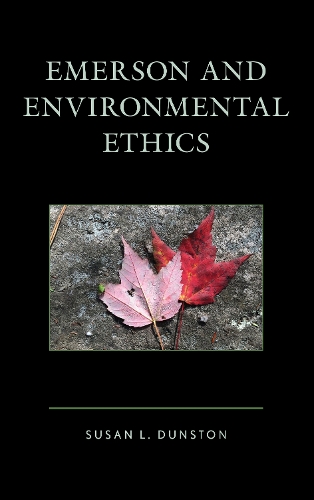
Emerson and Environmental Ethics
(Hardback)
Available Formats
Publishing Details
Emerson and Environmental Ethics
By (Author) Susan Dunston
Bloomsbury Publishing PLC
Lexington Books
15th September 2018
United States
Classifications
Professional and Scholarly
Non Fiction
Literature: history and criticism
191
Physical Properties
Hardback
152
Width 161mm, Height 230mm, Spine 19mm
413g
Description
At the core of Emersons philosophy is his view as a naturalist that we are made of the same atoms as the world is. In counterpoint to this identity, he noted the fluid evolution and diversity of combinations and configurations of those atoms. Thus, he argued, our relation and connection to the world are not occasional or recreational, but everywhere and always, and also reciprocal, ongoing, and creative. He declared he would be a naturalist, which for him meant being a knowledgeable lover of nature. Emersons famous insistence on an original relation to the universe centered on morally creative engagement with the environment. It took the form of a nature literacy that has become central to contemporary environmental ethics. The essential argument of this book is that Emersons integrated philosophy of nature, ethics, and creativity is a powerful prototype for a diverse range of contemporary environmental ethics. After describing Emersons own environmental literacy and ethical, aesthetic, and creative practices of relating to the natural world, Dunston delineates a web of environmental ethics that connects Emerson to contemporary eco-feminism, living systems theory, Native American science, Asian philosophy, and environmental activism.
Reviews
Ralph Waldo Emerson is often considered essentially a poet, in verse and prose. But Susan Dunston takes him seriously as a philosopher whose environmental ethics influenced such diverse figures as Henry Thoreau, William James, D. T. Suzuki, Aldo Leopold, Loren Eiseley, Annie Dillard, Alan Watts, and E. O. Wilson, and whose ecological concerns are paralleled in contemporary eco-feminism, Indigenous culture, and other forms. Implicit in Emersons stirring charge to Build . . . your own world, Dunston shows, is not egoism but rather an ethic of accountability, that we not harm. Her widely informed, close analyses of Emersons writings open exciting new contexts for understanding his Transcendentalist manifesto Nature (1836) as well as several of his essential essays. At the same time, her book is a quietly impassioned call for an empathetic sense of interconnected diversity and genuine nature literacy, which are desperately needed for our planets ecological health. -- Wesley Mott, Worcester Polytechnic Institute
Susan L. Dunston's Emerson and Environmental Ethics reacquaints readers with Emerson as a brilliant mind in his time and ours. Every chapter is full of surprising insights into his work and its relevance to the most compelling concerns of today. -- Catherine Rainwater, St. Edward's University
In this lucid, accessible, and beautifully writtenaccount of Emerson's philosophy, SusanDunston charts a compelling path from Emerson's unifying vision to muchlater environmental philosophies. Her magnificent close readings reveal a writer equally committed to a philosophical thinking that is "sensuous, experiential, and reformist" and a practice that is "attentive, relational, empathetic, and aesthetically sensitive." Readers of this book will discover a progressive, practical, and influential Emerson who remains thedeeply reflective writer we have long known. -- Kristin Boudreau, Worcester Polytechnic Institute
Author Bio
Susan L. Dunston is professor emerita at New Mexico Tech.
